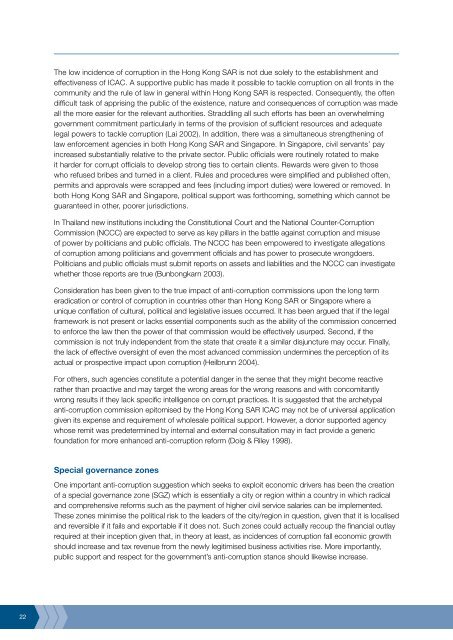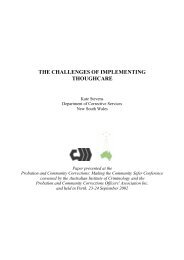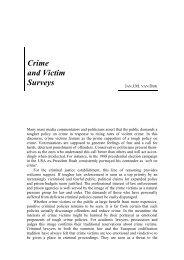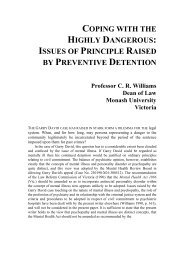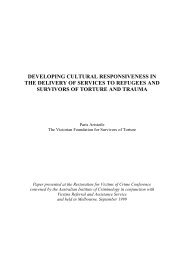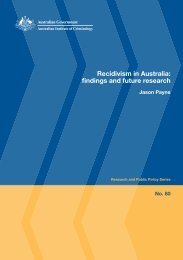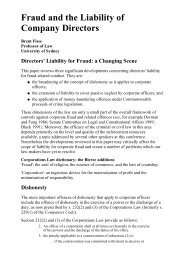Review of anti-corruption strategies Rob McCusker - Australian ...
Review of anti-corruption strategies Rob McCusker - Australian ...
Review of anti-corruption strategies Rob McCusker - Australian ...
You also want an ePaper? Increase the reach of your titles
YUMPU automatically turns print PDFs into web optimized ePapers that Google loves.
The low incidence <strong>of</strong> <strong>corruption</strong> in the Hong Kong SAR is not due solely to the establishment and<br />
effectiveness <strong>of</strong> ICAC. A supportive public has made it possible to tackle <strong>corruption</strong> on all fronts in the<br />
community and the rule <strong>of</strong> law in general within Hong Kong SAR is respected. Consequently, the <strong>of</strong>ten<br />
difficult task <strong>of</strong> apprising the public <strong>of</strong> the existence, nature and consequences <strong>of</strong> <strong>corruption</strong> was made<br />
all the more easier for the relevant authorities. Straddling all such efforts has been an overwhelming<br />
government commitment particularly in terms <strong>of</strong> the provision <strong>of</strong> sufficient resources and adequate<br />
legal powers to tackle <strong>corruption</strong> (Lai 2002). In addition, there was a simultaneous strengthening <strong>of</strong><br />
law enforcement agencies in both Hong Kong SAR and Singapore. In Singapore, civil servants’ pay<br />
increased subst<strong>anti</strong>ally relative to the private sector. Public <strong>of</strong>ficials were routinely rotated to make<br />
it harder for corrupt <strong>of</strong>ficials to develop strong ties to certain clients. Rewards were given to those<br />
who refused bribes and turned in a client. Rules and procedures were simplified and published <strong>of</strong>ten,<br />
permits and approvals were scrapped and fees (including import duties) were lowered or removed. In<br />
both Hong Kong SAR and Singapore, political support was forthcoming, something which cannot be<br />
guaranteed in other, poorer jurisdictions.<br />
In Thailand new institutions including the Constitutional Court and the National Counter-Corruption<br />
Commission (NCCC) are expected to serve as key pillars in the battle against <strong>corruption</strong> and misuse<br />
<strong>of</strong> power by politicians and public <strong>of</strong>ficials. The NCCC has been empowered to investigate allegations<br />
<strong>of</strong> <strong>corruption</strong> among politicians and government <strong>of</strong>ficials and has power to prosecute wrongdoers.<br />
Politicians and public <strong>of</strong>ficials must submit reports on assets and liabilities and the NCCC can investigate<br />
whether those reports are true (Bunbongkarn 2003).<br />
Consideration has been given to the true impact <strong>of</strong> <strong>anti</strong>-<strong>corruption</strong> commissions upon the long term<br />
eradication or control <strong>of</strong> <strong>corruption</strong> in countries other than Hong Kong SAR or Singapore where a<br />
unique conflation <strong>of</strong> cultural, political and legislative issues occurred. It has been argued that if the legal<br />
framework is not present or lacks essential components such as the ability <strong>of</strong> the commission concerned<br />
to enforce the law then the power <strong>of</strong> that commission would be effectively usurped. Second, if the<br />
commission is not truly independent from the state that create it a similar disjuncture may occur. Finally,<br />
the lack <strong>of</strong> effective oversight <strong>of</strong> even the most advanced commission undermines the perception <strong>of</strong> its<br />
actual or prospective impact upon <strong>corruption</strong> (Heilbrunn 2004).<br />
For others, such agencies constitute a potential danger in the sense that they might become reactive<br />
rather than proactive and may target the wrong areas for the wrong reasons and with concomitantly<br />
wrong results if they lack specific intelligence on corrupt practices. It is suggested that the archetypal<br />
<strong>anti</strong>-<strong>corruption</strong> commission epitomised by the Hong Kong SAR ICAC may not be <strong>of</strong> universal application<br />
given its expense and requirement <strong>of</strong> wholesale political support. However, a donor supported agency<br />
whose remit was predetermined by internal and external consultation may in fact provide a generic<br />
foundation for more enhanced <strong>anti</strong>-<strong>corruption</strong> reform (Doig & Riley 1998).<br />
Special governance zones<br />
One important <strong>anti</strong>-<strong>corruption</strong> suggestion which seeks to exploit economic drivers has been the creation<br />
<strong>of</strong> a special governance zone (SGZ) which is essentially a city or region within a country in which radical<br />
and comprehensive reforms such as the payment <strong>of</strong> higher civil service salaries can be implemented.<br />
These zones minimise the political risk to the leaders <strong>of</strong> the city/region in question, given that it is localised<br />
and reversible if it fails and exportable if it does not. Such zones could actually recoup the financial outlay<br />
required at their inception given that, in theory at least, as incidences <strong>of</strong> <strong>corruption</strong> fall economic growth<br />
should increase and tax revenue from the newly legitimised business activities rise. More importantly,<br />
public support and respect for the government’s <strong>anti</strong>-<strong>corruption</strong> stance should likewise increase.


